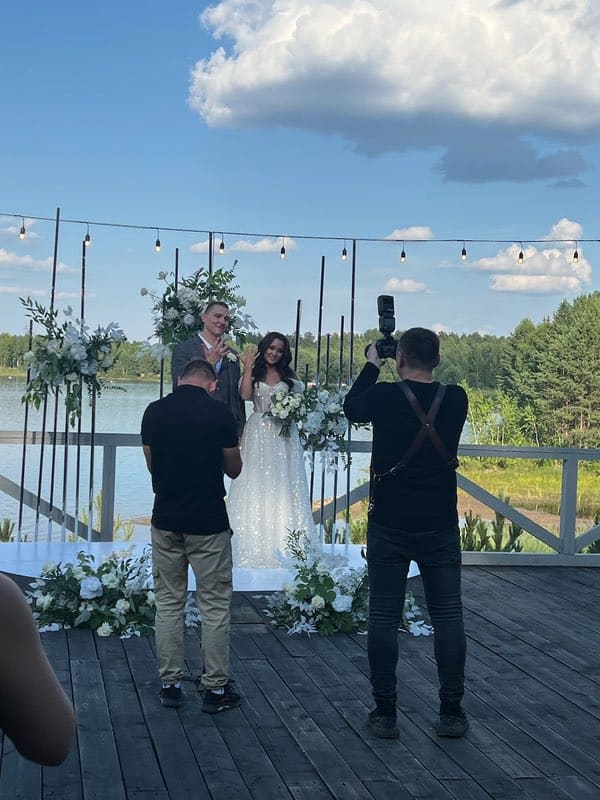
How to Properly Budget for a Wedding: Your Guide for Stress-Free Planning
After you’ve announced the exciting news of your engagement to family and friends, the real work begins – planning the wedding itself. With the average cost of a wedding in the UK currently sitting at £24,069, it’s normal to feel worried about your finances. However, creating a realistic budget for a wedding can transform the process from overwhelming to manageable. As part of our wedding budget tips, let’s dive into a step-by-step guide to help your day go smoothly without breaking the bank.
1. Create a wedding budget breakdown
The overall cost of your wedding will largely depend on whether you want to go all out or have a more intimate ceremony with a select number of guests. Start by creating a comprehensive budget for a wedding that you can comfortably afford, prioritising your list by importance. In addition to your budget, it’s also worth setting aside an extra 12.5% as a contingency should you exceed it.
The single biggest expense will likely be the venue itself, which is around £8,800 on average – you may then be charged a fee per head for catering. After this, you need to sort out your photographer, entertainment, flowers, wedding dress, cake, and wedding rings – all of which can total more than £5,000. That’s not even accounting for other smaller costs such as hair and beauty, invitations, and bridesmaid and groomsmen attire. And don’t forget the honeymoon!

Watch out when choosing the venue! The single biggest expense will likely be the venue itself. Sandy Alonso Photography
🎧👇 Want to listen to the rest of the post? Click the Spotify Podcast below:
Our Experience:
As wedding bloggers, we’ve heard countless stories from brides and grooms about navigating their budgets. One couple we worked with went spreadsheet-crazy, colour-coding every expense. They joked it was like doing a GCSE maths project, but it worked—they even came in under budget! Another bride told us she saved nearly £2,000 by opting for a weekday wedding. Their journey taught us that a detailed budget for a wedding is less about restrictions and more about creating the freedom to enjoy the big day without financial regrets.
Watch this video by The Ginger Frindge for more about creating a wedding budget breakdown:
2. Decide how you’ll pay for everything
Your wedding day will undoubtedly be memorable, and you’ll want this to be for all the best reasons. Since it’s also probably the most expensive day of your life, it pays to give thought to how you’ll cover the costs ahead of time.
The majority of couples will use their savings or borrow from family members. However, this isn’t always possible, meaning the sooner you can start setting a nest egg aside, the better.
Alternatively, there are many advantages to using a credit card for some of the costs, whether you choose to pay these off immediately or in the long term. UK credit cards have purchase protection, which is useful should something go wrong.
Another option is to take out a loan. While you’ll likely incur interest fees, a loan means you can repay your tab in fixed monthly installments over a set number of years, ensuring you can budget accordingly.
Our Experience:
One groom shared with us how his parents offered to pay for the venue but left the rest to him and his bride. They used a mix of credit cards and careful monthly savings to pull it off. Another bride we interviewed proudly DIY-ed her flower arrangements to save money—and they were stunning! Hearing these stories reinforced the importance of tailoring your payment strategy to what works best for you and your budget for a wedding.
3. Find ways to cut costs
Just because you don’t have the means to pay a premium for your wedding doesn’t mean you have to compromise on quality. There are plenty of ways to reduce your spending while still throwing the perfect day.
If you have your heart set on a specific venue, consider moving your wedding from the weekend to a weekday or from the Summer to Autumn. With potential savings of over £1,500, it’s no wonder why more couples are opting for weekday weddings.
Should you not be as fussed about the venue, consider cheaper options such as village halls, sports clubs, and holiday rental properties. Then, you can cater yourself, buy pre-made food, and supply the beverages.
Watch this video by Bhavi Byrne to learn some more useful tips:
Generally, local hairdressers or beauty schools will offer special deals for brides-to-be or may be willing to do it for free – or, if you’re confident in your abilities, do it yourself. Similarly, consider purchasing a dress from the preloved section of wedding dress stores or opt for an evening dress from a high street vendor.
Our Experience:
We’ve seen couples get creative to save on their budget for a wedding. One bride threw a charming barn wedding for a fraction of the typical cost by borrowing rustic decor from friends and using wildflowers for her bouquets. Another couple swapped a traditional cake for a doughnut tower, which was a huge hit—and much cheaper! These stories always remind us that cutting costs doesn’t mean cutting joy; it often means adding a personal touch.
To Conclude…
Planning a wedding can feel like trying to juggle flaming torches while riding a unicycle, but with a solid budget for a wedding in place, it doesn’t have to be. The key is prioritising what truly matters to you as a couple and staying flexible with the rest. Whether you’re saving costs with a weekday ceremony, using a credit card wisely, or opting for a preloved dress, every choice brings you closer to a day that’s uniquely yours. Remember, the most beautiful weddings aren’t measured by the money spent but by the love shared—and no budget can put a price on that. Happy planning!
Want to read more of our posts related to Wedding Budget? Check out these helpful guides:
Ways to cut wedding expenses without cutting corners – save money while keeping the magic intact.
Millennial money hacks for saving toward your dream wedding – creative savings strategies that actually work.
A review of the best wedding planner app – your digital fairy godmother for planning smarter.
My wedding budget review + free budget spreadsheet – see what worked and grab a free tool.
Wedding budget breakdown for catering, entertainment, and more – learn where your money should really go.
How much to put down on a wedding ring – understanding down payments and financing.
Destination wedding budget breakdown – allocating funds for travel, stays, and more.
Elegant wedding venues on a budget – smart ways to handle venue costs.
Using a wedding budget calculator – setting financial goals the easy way.
The real costs of wedding photography – what you need to budget for.
Surprising hidden costs to watch out for – avoid budget-breaking surprises.
DIY wedding invitation tips to save money – stylish invites on a budget.
20 unique ways to plan a wedding on a budget – tried and true ideas.
6 smart ways to save money for your wedding – practical tips to boost your savings.
Best Black Friday wedding deals – products worth grabbing.
Handling awkward money conversations – navigating family finances with grace.
Wedding etiquette advice from experts – what’s worth considering this year.









